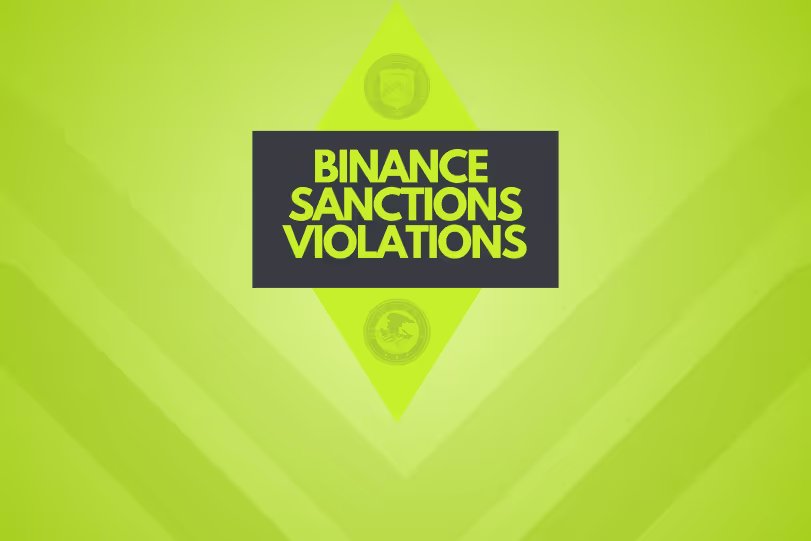
Binance Sanctions Violations: Here Are Our Takeaways
To say that Binance, the largest cryptocurrency exchange globally in terms of daily trading volume, had a brutal end to November 2023 is a gross understatement. Its CEO admitted money laundering and sanctions offenses, plus an historic $4.3 billion settlement with US authorities is seismic. This article dives into one facet of the scandal: the sanctions violations.
Binance's Deep Legal Woes: Here Is What Happened
Most readers will already be familiar with the unfolding Binance saga. After all, it's a story getting splashed above the fold in newspapers worldwide.
But before we jump into the focus of this article - Binance's multiple sanctions violations - let's quickly review the overall picture. Remember, this scandal involves a broad spectrum of financial crimes.
The US Treasury Department said the exchange failed to report more than 100,000 suspicious transactions linked to money laundering, ransomware attacks, terrorist financing, and many more heinous crimes.
It's also important not to forget that Binance, founded in 2017 with revenues of more than $12 billion, has been in the crosshairs of regulators in jurisdictions worldwide for years.
This article from sanctions.io, AML Regulations and Cryptocurrency Businesses, mentions Binance after hackers stole about $40 million of bitcoins from the exchange in 2019 (the company then pledged to enhance KYC measures significantly).
But back to the here and now.
Here is an overview of what happened in November 2023:
- Binance chief executive Changpeng Zhao resigned and pleaded guilty to a US criminal charge of failure to protect against money laundering.
- He also agreed to pay a $50 million fine.
- Binance, the company, pleaded guilty to criminal charges related to money laundering and breaching international financial sanctions, agreeing to pay more than $4.3 billion in penalties.
The next part of the article will zone in on the sanctions violations element to the case.
Binance's 2023 Sanctions Violations and Penalty
Before we reveal the key takeaways that all sanctions compliance professionals need to be aware of, let's examine what's been publicly released.
On November 21, 2023, the US Office of Foreign Assets Control (OFAC) distributed an enforcement release stating that it had settled with Binance for almost $1 billion for apparent violations of multiple sanctions programs (the specific amount is $968,618,825).
Note that the final $4.3 billion fine is made up of $3.4 billion to FinCEN and approximately $968 million to OFAC.
And here is the next jaw-dropping figure: According to OFAC, between August 2017 and October 2022, 1,667,153 apparent violations of multiple sanctions programs occurred in Binance transactions. Given the massive number of violations, OFAC also said the maximum financial penalty it could have levied on the exchange is, wait for it, $592 billion.
Given the complexity and depth of this case, this article cannot fine-comb through everything that happened. And once the dust settles, sanctions.io will undoubtedly revisit this topic with further insights.
But for now, we've cherry-picked information that is worth knowing right now.
Binance Severely Punished for Turning a Blind Eye
A standout characteristic of this case is what the US Department of Justice (DOJ) described as "turning a blind eye to its legal obligations in the pursuit of profit."
The key message in the DOJ media release was clear as day: The virtual currency industry will face deep legal trouble if it ignores compliance obligations, such as sanctions laws.
Focusing on how Binance evaded sanctions, the OFAC's enforcement release (you can read the PDF here) expanded on how the crypto exchange disregarded known sanctions risks:
Here are the highlights:
- Executives knew and permitted sanctioned jurisdiction users on its platform.
- They also knew US and sanctioned jurisdiction users were engaging in transactions with each other.
- Binance management even undermined its own compliance function, encouraging users to circumvent the ineffective sanctions controls they did have.
This list goes on and on with specific examples. In the interest of brevity, this article can't delve into all of them - but you get the gist. And reading between the lines, Binance's blatant disregard for legal obligations, such as sanctions compliance, irked the US government tremendously.
This total disregard for US laws is likely one of the reasons why they came down on them like a ton of bricks.
Remedial Measures Reveal What Everyone Else Should Be Doing
The next key takeaway from the OFAC sanctions penalty levied on Binance is what the enforcement release describes as remedial measures the exchange has put in place (since the investigation began).
But it's important to remember this: These OFAC measures only concern Binance's sanctions compliance breaches - as alluded to earlier, the case also covers other financial crimes.
In a high-profile televised November 21 press conference, US Attorney General Merrick Garland mentioned some of the overall remedial measures. For example, the US Treasury Department will have access to Binance's records and systems for the next five years.
But returning to the sanctions-related remedial measures implemented by OFAC.
Here are the highlights:
- Binance has implemented transaction monitoring, including sanctions screening in real-time.
- Binance also implemented technological controls to identify users from sanctioned jurisdictions (including IP blocking and geo-fencing).
- It also mandated sanctions training at the initial onboarding of new hires and for all employees (refresher training taking place yearly).
The complete list contains ten actions, which you can find beginning on page seven of this document.
To conclude this section, it's also worth understanding that OFAC enforcement releases contain information (such as remedial measures) that's purposefully highly detailed.
Why? OFAC sees them as an opportunity to communicate to the compliance world the systems and processes that organizations, for example, crypto and defi companies, should also have in place.
Closing Reflections: US Government Fires Off Warning
To finish this report, let's explore one final takeaway from one of the largest corporate penalties in US history.
Talking about the Binance case as a whole (not only the sanctions violations), the DOJ said the historic punishment was an "unmistakable message" to crypto and DeFi companies. And that they "must also play by the rules that keep us all safe from terrorists, foreign adversaries, and crime or face the consequences."
Only time will tell how many more cryptocurrency firms are on the radar of the DOJ, OFAC, and FinCEN.
But one thing is for sure: Now more than ever, companies must make sure their AML and sanctions compliance house is in order.
How sanctions.io Supports AML and Sanctions Compliance
sanctions.io is a highly reliable and cost-effective solution for sanction checking. AI-powered and with an enterprise-grade API with 99.99% uptime are reasons why customers globally, like crypto firms, trust us with their sanctions screening needs.
To learn more about how our sanctions, PEP, and criminal watchlist screening service can support your organization's compliance program:
We also encourage you to take advantage of our free 7-day trial (no credit card is required).
Further Breakdowns of Sanctions and AML Violation Penalties
This article is part of a series of reports revealing insights from sanctions and AML violations in 2023. Here are more from the blog:
- Reward Card Firm Penalized by OFAC for Sanctions Violations
- Emigrant Bank's OFAC Penalty Reveals a Screening Vulnerability
- Tornado Cash Saga Continues: Founders Charged With Money Laundering and Sanctions Violations
- OFAC Penalizes Building Materials Firm in Iran Sanctions Case: Insights for Compliance Pros
- Key Takeaways From Deutsche Bank's $186 Million Sanctions and AML Penalty
- Microsoft's 2023 Sanctions Penalties: 5 Key Learning Points
- Learning From BAT's $635M North Korea Sanctions Fine: 5 Key Insights
- Unravelling Swedbank's $3.4 million OFAC Sanctions Penalty: 3 Key Insights



